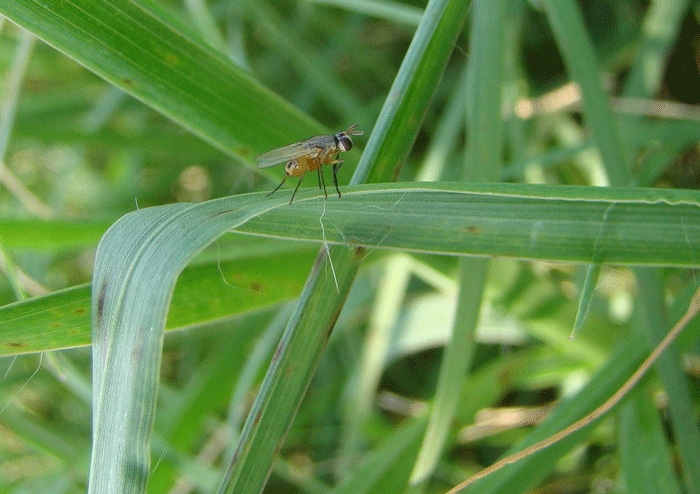July 15, 2014

The first high populations of Bermudagrass stem maggot are now occurring in Central Florida and likely will be seen in North Florida any day now, if not already.
The adult stage of this pest are small flies. The flies lay eggs in Bermudagrass fields of all types. The maggots or larva hatch and burrow in the top node of the plant and feed, eventually killing the top leaf shoot. Loss of both quality and quantity of Bermudagrass hay results. Producers should be on the lookout for BSM populations, signs of which are manifested by a brown coloring to the field that should be green.
BSM larvae present in the stems can be detected by splitting the stems down the middle from the tip toward the first node. Early stage larvae will be found in green stems, and late stage larvae in tips that appear to be turning color on one side, while the other side of the stem remains green.
Previous infestation of stems that are brown and appear dead can be determined by gently pulling the dead tip out of the stem and looking for evidence of maggot feeding. Mature BSM larvae leave the stems to pupate in the soil and emerge as adult flies in a week to 10 days.
Want access to the very latest in agriculture news each day? Subscribe to Southeast Farm Press Daily. It’s free!
Producers should make a decision about what to do about a stem maggot infestation based on the maturity of the crop, and the level of the infestation. The best remedy is to cut the hay, and worry about the next hay cycle as it occurs. If the hay is weeks from maturity, then the fields may be treated with a pyrethroid insecticide, if the economic return is deemed warranted.
The BSM was first detected in GA in 2010 and has since spread across the southern U.S. Thus, we have only a few years of experience and large data gaps in our knowledge of how to manage this pest. UF/IFAS personnel are actively working on a better understanding of BSM and its impact and management.
You May Also Like




